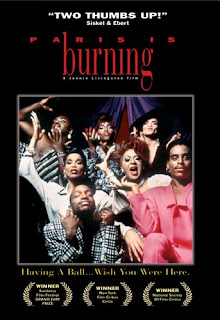Having a ball...wish you were here





Pepper LaBeija, Dorian Corey, Anji Xtravaganza, Willi Ninja...
Before watching Paris Is Burning, if I saw these names i might think of: are those really names? After watching it, i thought: these were just a group of people who gathered and shared the same interests. They were Drag Queens.
I had never heard of ball cultures, drag queens, voguing, or even black-gay-culture? I'm still a freshman in this area. I never really met a gay guy in my lifetime, maybe i will in the future; but till now, gay men were just a term for me. These black-gay-men were a marginalized culture somewhere in America, best known were in New York City. They gathered, having balls, voguing, houses that actually meant something to them; semiotically speaking, those things were just signifiers, they actually signified the identities, genders, families of these gay people.
In this film, most of the gay guys were transvestites, meaning a guy who enjoyed wearing women clothes, and they even want to be prettier than women. Women clothes were signifiers, when they put on those women outfits, it signified their gender, women. This was what they want, they want to be a woman, at least be like a woman, and loved by men, marry with men. One of the gay man named Venus in the movie, i found he had an interesting idea: he didn't think of himself as a guy, he was just a girl with a penis. That was very true for him, he looked more feminine than most girls. Moreover, they talked a lot about sex change in the movie. Sex changing was a sign of being a REAL women for them, some of them thought it doesn't worth it; whereas some of them would die for it. Those who had their breast implanted or had their sex changed, they were so satisfied and happy and rejoiced for it; those who thought sex change weren't their thing at first, and time goes on they were still gratified by their decision that not having a sex change. Like Pepper Labeija said: what for? Things didn't seem getting well, women still got beaten up, robbed and mugged. These unfortunate things were a sign of being a transgender woman for him.
Moving on, these people gathered weren't doing nothing, they vogued, having competitions, having balls. Balls signified identities for them in a way, they were the ball-goers. In the balls, they had competition, they could be whoever and whatever they want. In those competition, they won trophies. Trophy was a signifier of status for them. They got status, they got fame. Besides, competitions were separated into categories, like realness, voguing, high fashion coats, outfits for different occupations, etc. They even have trends too, like in earlier days they tended to dress like exotic Las Vegas showgirls with those beats and feathers; then they wanted to look like those gorgeous movie stars; later they thought of being trim and elegant supermodels.
Looking like these beautiful women signified fulfillments for them, and being one of these supermodels was some of the drag queens ultimate dream. So they invented Voguing, a kind of dance which using the poses inside the magazine, Vogue. Dancing with those poses made them feel like one of the Vogue models, an accomplishment for them, to show off their perfect body line. Voguing signified their attitude, style, theatricalism, and talents.
On the other hand, a lot of them got kicked out of the family because of being gays, drag queens. Some of them just ran away from home because they didn't want to embarrass their family. Some normal families just disowned their son when they found out they were gay. Houses like Labeija, Xtravaganza, Pendavis, Saint Laurent signified home for those homeless black gay guys. And every home has a mother as the leader, these leaders have great responsible for the children in their house. The Mother did every real mother does, when the 'children' were to perform, mother helped them in choosing their shoes and outfits. In addition, they shared their problems, 'children' looked up to their mothers. The houses were signifiers for home, it gave you warmth, shelters, helps, it represented the lost homes of those 'children'.
As the situation of Mohd Ashraf, he was having a much tougher circumstances. First he is a malay muslim, malays are considered more religious, his parent's decision to disown him is unavoidable. Even the laws of country couldn't bear with it, causing him to have difficulties in changing his name. It was just changing a name, why make it a big fuss? We can't blame Mohd Ashraf for wanting to change his name, names are printed in MYKAD; MYKAD signifies our identities, all information related to us can be found in MYKAD, if the data in it isn't right, then it doesn't mean anything to us. I think Mohd Ashraf thought this way too.
To conclude, Mohd Ashraf was having the same issues with those 'children' in New York City, no matter what race, or what nationality you are, transgender people shared the common problems. Paris is Burning made me realized that there was something like this happened around us, around the world, and we have to admit that. Paris is Burning now.



This essay is not up to your standard. Mostly you describe what is in Paris Is Burning rather than really analyse it. Your reading of the ST article is superficial. You don't deal at all with the semiotics of gender in Malaysia.
ReplyDelete6.5/8